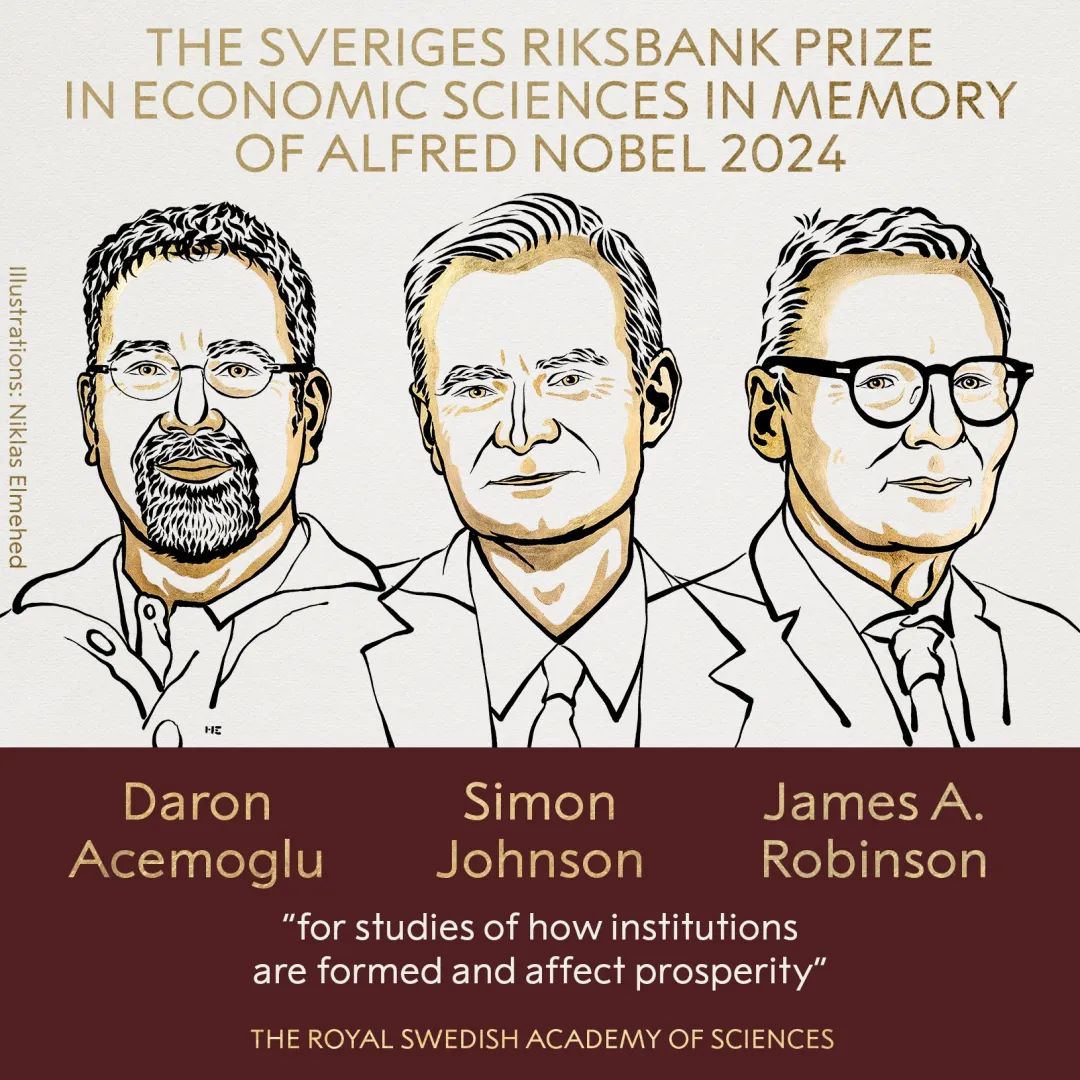原文作者:陈沁涵,澎湃新闻记者

当地时间10月14日,瑞典皇家科学院宣布,将2024年诺贝尔经济学奖授予达龙·阿西莫格鲁(Daron Acemoglu)、西蒙·约翰逊(Simon Johnson)和詹姆斯·A·罗宾逊(James A. Robinson),以表彰他们“对制度如何形成及其对繁荣的影响的研究”。
评审委员会在新闻稿中称,这三位经济学家向大家展示了社会制度对一个国家繁荣的重要性。“法治不健全以及剥削人口的制度的社会无法产生增长或带来积极变化,他们的研究帮助我们理解原因。”
阿西莫格鲁于1967年出生于土耳其首都伊斯坦布尔,1993年以来在麻省理工学院任教,2005年获得克拉克奖,研究领域广泛涵盖政治经济学、经济发展、经济增长、技术变革、不平等、劳动经济和网络经济学等。他与本次共同获奖的另外两位经济学家合著了大量论文,与罗宾逊共同著有《国家为什么会失败》、《狭窄的走廊》等畅销书。
近年来,阿西莫格鲁的研究重点之一是工业机器人等自动化技术对劳动力市场的影响。2023年,他与西蒙·约翰逊合著的《权力与进步》出版,该书论述了AI作为当前时代最重要的技术所面临的困境。
“我的许多研究集中在政治经济学和技术变革之间的相互作用,这是塑造我们能力和成长机遇的两大力量,同时也在影响我们的政治和经济选择。”今年6月,阿西莫格鲁在接受澎湃新闻专访时表示。
他研究发现,当前AI的发展轨迹正在重复并加剧过去几十年最糟糕的一些技术性错误。例如,过分强调自动化,而没有为创造新任务进行充足的投资。他认为,企业掌管者需要意识到其最大的资产是工人,与其专注于削减成本,应该寻找提高工人的生产力、能力和影响力的方法。
阿西莫格鲁非常担忧AI成为将财富和权力从普通人转移到一小群科技企业家的方式,为打破大型科技公司的政治力量,他认为“仅仅依靠反垄断是不够的,我们更需要将技术重新引导到对社会有益的方向”。
他提出,可以考虑三个原则引导AI发展:一是优先考虑机器有用性,二是赋予工人和公民权力,而不是试图操纵他们,三是引入一个更好的监管框架,让科技公司承担责任。
*以下为澎湃新闻于2024年6月16日对阿西莫格鲁的专访文章,原标题为《专访|麻省理工教授:担心AI成为将财富和权力转移至少数科技企业家的工具》。”
参考消息网6月15日援引美国有线电视新闻网(CNN)报道,苹果公司13日超越微软,成为美国市值最高的上市公司。上周该公司在其一年一度的全球开发者大会上宣布了包括iPhone的生成式人工智能功能在内的一系列消息,其股价因此一路攀升。
苹果、英伟达、微软,一直在激烈争夺全球最有价值公司的宝座。苹果公司在重新定义了“AI”一一苹果智能(Apple Intelligence)后,市值反超因AI芯片而身价暴涨的英伟达,又一路赶超微软,重夺第一。当前苹果的市值为3.29万亿美元,略高于微软的3.28万亿美元。生成式人工智能成为推动三大科技巨头市值上涨的核心动力。
面对这股AI热潮,美国国家经济研究局近期发布了一篇由麻省理工学院教授达龙·阿西莫格鲁(Daron Acemoglu)撰写的论文,指出未来人工智能(AI)进步带来的生产力提升可能并不大,预估今后十年AI对全要素生产率(TFP)的增长上限不超过0.66%。
阿西莫格鲁在文中指出,生成式人工智能是一项很有前途的技术,但除非行业进行根本性的重新定位,包括对生成式人工智能模型(例如大语言模型LLMs)的架构进行重大改变,以专注于可靠的信息,来提高各行业工人的边际生产力,而不是优先考虑开发通用的、类似人类的对话工具。
围绕人工智能对生产力和经济增长的一些过度乐观预测,阿西莫格鲁持怀疑态度。他作为一名出生在土耳其的美国经济学家,以其政治经济学方面的研究而闻名,并且长期关注政治经济学和技术变革之间的相互作用。
去年,他与英裔美国经济学家西蒙·约翰逊合著了一本新书《权力与进步》(Powerand Progress)出版,谈到了可能颠覆人类社会的AI革命,他们认为目前AI发展已误入歧途,许多算法的设计是尽可能地取代人类,“但技术上取得进步的方式是让机器对人类有用,而不是取代人类”。
Open AI首席技术官米拉·穆拉蒂(Mira Murati)在5月的一场活动上,就开发通用人工智能(AGI)的争议表示,他们不仅专注于增强模型的功能和实用性,同样着力于确保其安全,使之与人类的价值观保持一致,不会陷入失控,从而创建造福人类的 AGI。
“随着我越深入研究AI的能力和发展方向,越确信它当前的发展轨迹正在重复并加剧过去几十年最糟糕的一些技术性错误。”阿西莫格鲁教授近日接受澎湃新闻(www.thepaper.cn)专访时谈到,AI领域的大多数头部玩家都是由不切实际且危险的梦想驱动,即实现通用人工智能的梦想,“这是将机器和算法置于人类之上”。
一些分析人士将阿西莫格鲁视为AI悲观主义者。他回应澎湃新闻称,作为一个社会科学家,会更加关注一些负面的社会影响。
阿西莫格鲁常常和身为麻省理工学院电子工程和计算机科学系负责人的妻子奥兹达格拉尔(Asu Ozdaglar)教授一起工作。虽然领域不同,但夫妻俩对于AI发展的看法在大方向上是一致的,不过阿西莫格鲁也坦言,他的想法可能比妻子更加悲观。
随着人工智能商业化的竞速,AI大模型百舸争流,但毫无疑问,像Open AI 、微软、谷歌、英伟达等科技巨头已经抢占了AI发展的先机。阿西莫格鲁说,他非常担心AI成为将财富和权力从普通人转移到一小群科技企业家的方式,现在我们看到的“不平等”是“煤矿里的金丝雀”。
技术与社会:最大的资产是人
Q1:您的研究涵盖了政治经济学、技术变革、不平等等多个领域。在怎样的背景和契机之下,您开始关注技术发展对不平等的作用?您最初对技术发展的看法是什么,又如何演变为现在所主张的“当前人工智能的发展路径既不利于经济也不利于民主”?
阿西莫格鲁:
我的许多研究集中在政治经济学和技术变革之间的相互作用,这是塑造我们能力和成长机遇的两大力量,同时也在影响我们的政治和经济选择。
AI已经成为这个时代最重要的技术,一方面因为它吸引了大量的关注和投资,另一方面因为它取得了一些引人瞩目的进步,尤其是随着GPU性能的提高。还有部分原因是AI无处不在的影响。这些因素促使我在这一领域进行研究。
随着我越深入研究AI的能力和发展方向,越确信它当前的发展轨迹正在重复并加剧过去几十年最糟糕的一些技术性错误——过分强调自动化,就像我们优先考虑自动化和其他数字技术,而没有为创造新任务进行充足的投资;以及社交平台试图利用人们的数据和兴趣盈利,因此犯下的所有错误。
我还特别关注这样一个事实,AI领域的大多数头部玩家都是由不切实际且危险的梦想驱动,即实现通用人工智能的梦想,这是将机器和算法置于人类之上,也通常是这些头部玩家凌驾于其他人的一种方式。
Q2:先进的计算机技术和互联网让许多富翁实现了财富转移,并使科技巨头空前强大。尽管如此,我们依然接受这样的技术革新,因为它也带来了积极的影响。技术变革有利有弊,从历史来看社会总能找到适应新技术的方式。新一轮科技浪潮席卷而来,您为什么认为不平等问题特别令人担忧?
阿西莫格鲁:
当谈及社交平台和人工智能时,我同意上述说法,但是涉及互联网情况就不同了,我有不同的意见。我认为互联网在某些方面使用不当,当然也不否认互联网是一项非常有益的技术,在达成人与人的联通、向人们提供信息以及为创造新服务和平台方面,它发挥了非常重要的作用。
对于人工智能,我非常担心它成为将财富和权力从普通人转移到一小群科技企业家的方式。问题是我们没有任何必要的控制机制以确保普通人从AI中获利,比如强有力的监管、工人参与、公民社会和民主监督。我们看到的“不平等”是“煤矿里的金丝雀”,意味着更糟糕的事即将到来。
Q3: 您指出自动化造成的不平等是“企业和社会在选择如何使用技术后导致的结果”。随着科技巨头市场能力和影响力壮大甚至可能失控,我们应对的关键是什么?如果您担任一家大型科技公司的CEO,会如何利用AI来管理这家公司?
阿西莫格鲁:
我对CEO们的建议是,要意识到他们最大的资产是工人,与其专注于削减成本,应该寻找提高工人的生产力、能力和影响力的方法。这表明要使用新技术为工人创造新的任务、开拓新的能力。
当然,自动化是有益的,我们也必然会在未来更多地应用自动化,但这不是为了提高生产力所唯一能做的,自动化也不应该是CEO们唯一追求和优先考虑的事情。
Q4:美国反垄断执法者已经公开表达了对人工智能的一系列担忧,美国司法部和联邦贸易委员会据称达成了一项协议,为微软、OpenAI和英伟达的反垄断调查铺平了道路。这种针对大型科技公司的反垄断行动是否能真正地增加市场竞争并避免AI发展被少数公司所主导?
阿西莫格鲁:
绝对能够起到作用,反垄断很重要,科技行业一些问题的根源在于美国缺乏反垄断执法。五大科技公司都在他们所在的领域确立了牢固的垄断地位,因为他们能够在没有任何监管的情况下收购潜在的竞争对手。在某些情况下,他们为了巩固垄断地位,购买并停用了可能与他们构成竞争的技术,我们绝对需要反垄断,以打破大型科技公司的政治力量,这种力量在过去三十年变得非常强大。
但我也想强调,仅仅反垄断是不够的,我们更需要将技术重新引导到对社会有益的方向。如果仅仅将Meta拆分为Facebook、Instagram和WhatsApp,是不可能实现(增加市场竞争和避免少数公司主导AI发展)。在AI领域,如果担心AI技术被用于操纵、监视或其他恶意目的,反垄断本身不会是解决方案,反垄断必须与更广泛的监管议程相结合。
技术与人:如何避免重蹈覆辙
Q5:您一直强调“机器有用性”(machine usefulness),即 “试图让机器对人类更有利”。您认为应该如何实现这一目标?无法达成这样的目标会出现什么后果?
阿西莫格鲁:
这与上述给CEO们的建议有关。我们想要的是能够拓展人类能力的机器,就AI而言,有很大的可能性达成这一点。AI是一种信息技术,所以我们应该考虑什么样的AI工具可以为人类决策者提供有用、情境依赖的即时信息,可以利用AI工具使人类成为更好的问题解决者,能够执行更复杂的任务。这不仅仅是针对创意工作者、学者或记者,对于蓝领工人、电工、水管工、医疗保健工作者以及所有其他职业都是如此。更好地获取信息可以推动产生更明智的决策和执行更高层次的任务,这就是机器有用性的意义所在。
Q6:您建议对工人劳动给予公平的税收待遇。对设备和软件像对待人类雇员一样征税,或者进行税收改革以鼓励就业而不是自动化,这些是实际可行的解决方案吗?
阿西莫格鲁:
是的,我与西蒙·约翰逊在《权力与进步》中共同提出,一个更公平的税收制度可以作为解决方案的一部分。在美国,在企业雇佣劳动力时面临的边际税率超过30%。当他们使用计算机设备或其他机械执行相同任务时,税率不到5%,这就为自动化提供了过度的激励,同时阻碍了就业和对培训及人力资本的投资。将资本和劳动力的边际税率统一到相同水平是一个合理的政策想法。
Q7:您提议进行税收改革,以奖励就业而不是自动化。这样的改革将如何影响企业对自动化技术的应用和投资?
阿西莫格鲁:
在这方面必须要谨慎,不要打击投资,特别是在许多国家需要快速增长,需要在可再生能源和医疗保健技术等领域注入新的投资。但如果我们能鼓励技术以正确的方式发展,这对企业也是有好处的。因此我的提议是消除对自动化的过度激励,并希望它能以一种不会普遍打击商业投资的方式实现。
Q8:社交平台的快速发展带来了一些负面的影响,例如信息泡沫和错误信息的传播。您认为我们如何避免在人工智能的进一步发展中重复同样的错误?
阿西莫格鲁:
有三个原则有助于避免重蹈覆辙:(1)优先考虑机器有用性,正如我主张的那样;(2)赋予工人和公民权力,而不是试图操纵他们;(3)引入一个更好的监管框架,让科技公司承担责任。
技术与行业:数字广告税让行业更具竞争力
Q9:技术专家贾伦·拉尼尔强调互联网用户的数据所有权问题。您认为在政策上,个人数据的所有权和控制应该如何得到更好的保护?
阿西莫格鲁:
我认为这是一个重要的方向。首先,我们将需要越来越多的高质量数据,而生产这些数据的最佳方式是通过奖励创造高质量数据的人,数据市场可以实现这一点。第二,数据目前正被科技公司掠夺,这不公平也不高效。
然而,关键在于数据市场并不像水果市场那样,我的数据通常可以高度替代你的数据,所以如果科技公司可以与个人谈判购买他们的数据,就会出现“逐底竞争”(race to the bottom),这样做的行政成本会非常高。所以我认为,运行良好的数据市场需要某种形式的集体数据所有权,可以是数据工会或数据行业协会,或其他集体组织的形式。
Q10:您怎么看引入数字广告税以限制由算法驱动的错误信息进行盈利?这样的税收政策可能对数字广告行业和信息传播产生什么影响?
阿西莫格鲁:
我支持数字广告税,因为基于数字广告的商业模式极具操纵性,它们与创造情感愤怒、数字成瘾、极端嫉妒和信息茧房的策略是协同的。它们也能与利用个人数据的商业模式相协同,会导致心理健康问题、社会两极分化、民主公民减少等负面后果。
更糟糕的是,如果要像我建议的那样重新制定AI的发展方向,我们需要引入新的商业模式和新平台,但如今基于数字广告的商业模式使之失去了可能性。你无法基于用户订阅启动一个新的社交平台,无法复制维基百科的成功,因为你反对那种提供免费服务并拥有大量客户基础的公司。所以,我将数字广告税视为使科技行业更具竞争力的一种方式:获取用户数据并通过数字广告盈利的“低级手段”如果能够被遏制,就会涌现新的商业模式和更多样化的产品。
Q11:能否分享一些您所认为的未来技术发展可能带来的积极变化,以及我们应该如何准备并推动这些变化?
阿西莫格鲁:
如果我们正确使用人工智能,可以提高各行各业工人的职业技能,也可以改进科学发现的过程。我还认为有一些方法能够民主地使用AI。
免责声明:本文章仅代表作者个人观点,不代表本平台的立场和观点。本文章仅供信息分享,不构成对任何人的任何投资建议。用户与作者之间的任何争议,与本平台无关。如网页中刊载的文章或图片涉及侵权,请提供相关的权利证明和身份证明发送邮件到support@aicoin.com,本平台相关工作人员将会进行核查。



